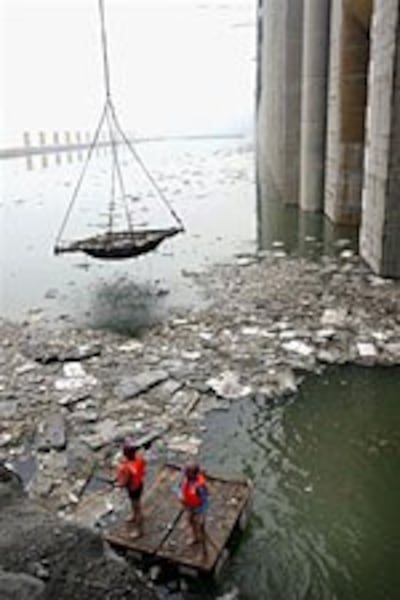
China is sending mixed signals on its successes in fighting pollution in a new report on the environment, experts say.
On June 5, China’s State Council released a 45-page white paper on the state of China’s environment and government anti-pollution efforts since 1996.
The white paper provides little data on the increase in pollutants in water, soil, and air, but it says the State Environmental Protection Administration (SEPA) has established more than 3,200 departments with 167,000 people engaged in activities including monitoring and research of the problem.
China’s government is “fully aware of the grave situation of environmental protection in China,” according to the report.
Despite assertions that “the trend toward aggravated environmental pollution and ecological destruction is slowing down,” SEPA deputy director Zhu Guangyao offered a dissenting view.
"Despite government efforts, China's environmental picture is not improving, but worsening," Zhu said in comments carried by the official China Daily newspaper.
The challenge of environmental protection in China today remains a very serious one and one in which, overall, there is not significant progress being made,
In interviews with Radio Free Asia, experts on China’s environment largely agreed with Zhu’s assessment.
'Trends are not getting better'
Elizabeth Economy, director of Asia Studies at the New York-based Council on Foreign Relations, said that “the challenge of environmental protection in China today remains a very serious one and one in which, overall, there is not significant progress being made.”
“I think that with growing awareness within the Chinese population, you will find fewer and fewer people that in fact believe the environment is getting better,” Economy said.
Economy said China’s citizens have grown frustrated over government failures to combat health risks from pollution and industrial waste. Thousands of phone calls made to environmental hotlines are only one measure of public discontent, she said.
“When [the Chinese people] can’t get effective legal redress, they turn to protest. And in many instances we’ve seen that these protests turn violent, and you can have 30,000 or 40,000 people protesting polluting chemical factories.”
“People die in these protests,” Economy said.
Economy added that SEPA officials attempt to enforce regulations protecting the environment but are often resisted at the local level, where regulators answer to local governments with ties to polluting factories and employers.
William Chandler, an energy expert and adjunct professor of international policy at the Johns Hopkins School of International Studies in Washington, said there is little evidence for the white paper’s claim that “the amount of pollutant emission of industrial products has declined.”
“There are some things, important things, like sulfur emissions which are being slowed down, even reversed,” Chandler said. “But in general, the trends are not getting better.”
According to an Associated Press report, SEPA deputy director Zhu Guangyao has called for legislation giving legal protection to private environmental groups fighting pollution.
Greenpeace, the World Wildlife Fund, and other groups have said that such a move would need the support of China’s top leaders, though, the report added.
Original reporting by Michael Lelyveld. Edited for the Web by Richard Finney.
